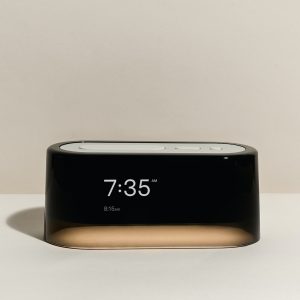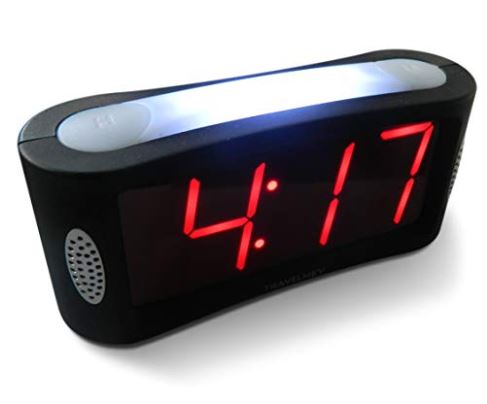Buying Guide – How to Shop for an Alarm Clock
Alarm clocks have come a long way in recent years. In addition to programmable alarms and snooze options found on traditional models, many of today’s alarm clocks are Wi-Fi-accessible, and include phone, email, and live-chat functions. Other features may include brightness control, automatic time syncing, and different modes for weekday and weekend alarms, and most newer clocks also allow owners to choose from a wide range of different alarm tones and sound effects.
This guide will look at the shared features and functions of most alarm clocks sold today, as well as our top picks for alarm clocks at different price-points.
Common Features and Functions of Alarm Clocks
Every alarm clock is different, but characteristics shared by most models sold today include the following:
Alarm Features
- Alarm Customization: An alarm clock, by definition, allows users to program alarms based on their individual needs. Basic designs allow one or two different alarm times, while more advanced models may allow up to six or more. A select number of newer clocks also offer dedicated weekday and weekend alarms that allow users to get more sleep on days when they don’t work.
- Snooze Button: When users hit the snooze button, it triggers a delayed alarm that allows them to sleep or rest for a few more minutes. Traditional alarm clocks feature an automatic 10-minute snooze, but most models made today allow users to customize the snooze duration as they see fit. Some alarm clocks also feature ‘gradual wake up’ settings that sound the alarm at quieter levels that gradually increase until the user turns off the snooze.
Display Features
- Visual display: In addition to the current time, some alarm clocks display other information, such as the current date and temperature. Many modern designs feature LCD displays that can be brightened or dimmed to match the user’s visual preferences.
- Time projector: Some alarm clocks will project the time onto ceiling and wall surfaces. This allows sleepers to check the time without shifting positions in bed.
Sound Features
- Sleep music timer: Alarms that allow music playback may come with a sleep timer that allows users to listen to music for a preset length of time as they fall asleep.
- Volume: Some people prefer loud alarms, while others find that quieter alarms are more effective. Alarm clocks usually allow users to adjust the volume to their ideal level, and some also feature vibrating alarms for gentler wake-ups. The maximum volume in an alarm clock sold today may range anywhere from less than 60 decibels (dB) to more than 110.
- Sound quality:Some alarms, especially those that play music, use stereo speakers of varying size and intensity. The level of volume that a speaker can handle without distorting is determined by its watts root mean square (or Watts RMS) level. It’s common to find radio alarm clocks with between seven and twelve Watts RMS. In terms of frequency range and other sound quality indicators, make sure to check the reviews before buying online.
Connectivity
- Automatic time sync: Traditional alarm clocks require users to manually adjust the time when the device is unplugged or the power goes out, but some newer models automatically sync based on an internal clock. These models may automatically adjust for Daylight Savings Time too.
- Power source: The majority of alarm clocks sold today are powered through AC electrical outlets, while some are battery-operated. Some AC-powered models can also be loaded with backup batteries in case of power outages.
- USB charging: Like many electronic devices sold today, some alarm clocks feature USB ports that can be used to charge smartphones, tablets, and other devices.
- Bluetooth compatibility:Many newer alarm clock models can be linked to Bluetooth speakers using a wireless connection.
Smart Features
It’s becoming increasingly common for alarm clocks to integrate smart features into their design. These items use wireless connectivity to link with apps via the internet, providing a variety of extra uses and features. Using the Amazon Echo Spot as an example, smart alarms often let you use voice commands to set timers or make phone calls. It’s also possible to turn on music or access the internet or a TV program. These features are often hands-off, letting you get more accomplished without having to manually set an alarm or pick up a phone.
These attributes provide a modern touch for your alarm, giving it abilities far beyond just waking you up on time.
Important Considerations for Alarm Clock Shoppers
When shopping for a new alarm clock and comparing different brands and models, here are a few important questions to keep in mind:
- How much should you pay for an alarm clock? Traditional alarm clocks are widely available for $40 or less through most online retailers, and some newer designs are sold at similar price-points. However, some advanced models may cost as much as $130 or more. Ultimately, you should determine a feasible alarm clock budget before you begin comparing different models.
- How many customizable alarms does the clock allow? Some users only require one or two alarms, but people with rotating work schedules or other day-to-day variances may need a clock that allows them to program several different alarms throughout the week.
- Does the clock feature multiple alarm sounds? This is an important consideration for people whose sound and music preferences tend to change from night to night.
- Is the snooze alarm adjustable? While traditional alarm clocks have a default snooze of roughly 10 minutes, an adjustable snooze may be more suitable for some users.
- Does the clock automatically sync? People whose residences are prone to power outages may find that automatically syncing alarms are more suitable.
- What is the volume range? Some alarm clocks are softer than others, and users should select an alarm clock based in part on their preferred volume. It’s important to note that many alarm clock manufacturers do not disclose the specific decibel range for the alarm volume.
- Is there a visual display? A visual display that shows the date, temperature, and other information can be helpful for some users, and displays that project the time onto ceiling or wall surfaces allow sleepers to check the time without rolling over.
- What is the power source? Assuming the alarm clock is AC-powered, cord length may be an important factor for users depending on their bed’s proximity to an electrical outlet (though extension cords can be used). Clocks with backup batteries are usually suitable for people who frequently lose power.
- How big is the alarm clock, and how much does it weigh? Though most alarm clocks are relatively compact and lightweight, some are more suitable for smaller spaces and travel than others.
- Does the alarm clock feature USB ports? These allow users to charge their smartphone, tablet, and other devices using the clock itself.
- Is the alarm compatible with bluetooth speakers? Because of their wireless connection, bluetooth speakers may be more suitable for some bedroom configurations than wired speakers.
- Is there a trial period? Some alarm clocks — mostly higher-end models — allow customers to return their alarm within a certain window period. Most, however, do not offer trial periods.
- How long does warranty coverage last? Most alarm clock warranties will cover the product for up to one year, but some alarm clocks do not come with warranties.
Alarm Clock Alternatives
Let’s look at a few relatively low-cost alternatives for those who would prefer not to invest in an alarm clock.
Phone Alarm: Virtually all smartphones sold today (as well as older models) come equipped with an alarm clock, as well as multiple alarm options and different sound effects and ringtones to accommodate users with different preferences. These features are free to use apart from the initial cost of the phone itself; although smartphone price-points vary by provider or retailer, the average cost of a new smartphone in 2017 was more than $500.
The bottom line: As long as you already have a working smartphone, using the device’s pre-programmed alarm is a cost-effective alternative.
Smart Lights: If you’re not into blaring alarm clocks, you can always choose lighting to create a noise-free alarm. During certain times of day, light can stimulate the body, suppressing melatonin levels and naturally signaling to your body that it’s time to get up and start a new day.
Alarm Apps: The average alarm clock app — which can be downloaded onto a smartphone, tablet, or other electronic device — costs $1 or $2, and many are free. Apps offer many of the alarm, snooze, and automatic time sync features as top-rated alarm clocks. For more information about alarm clock app options, please check out our Top Sleep Apps page.
Additional Resources
To learn more about using alarm clocks and timing your sleep more effectively, please visit the following pages:





